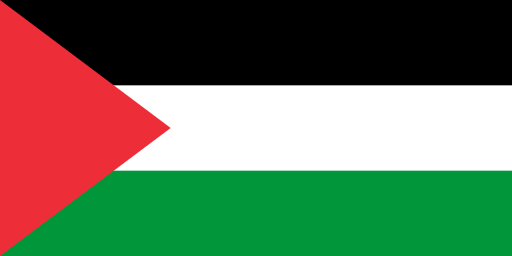Educational Research Feature
Flag of Palestine
Palestine is a geographic region in Western Asia between the Mediterranean Sea and the Jordan River. The region comprises most of the territory claimed for the biblical regions known as the Land of Israel, the Holy Land or Promised Land.
Situated between Egypt, Syria and Arabia, and the birthplace of Judaism and Christianity, the region has a long, tumultuous history as a crossroads for religion, culture, commerce, and politics. Today, the region comprises the State of Israel and the Palestinian territories in which the State of Palestine was declared.
The State of Palestine is a de jure sovereign state in the Middle East, recognized by 136 UN members, and since 2012, has a status of a non-member observer state in the United Nations – which is a de facto, or implicit, recognition of statehood. The State of Palestine claims the West Bank (bordering Israel and Jordan) and Gaza Strip (bordering Israel and Egypt) with East Jerusalem as the designated capital.
Most of the areas claimed by the State of Palestine have been occupied by Israel since 1967 in the aftermath of the Six-Day War. Its independence was declared on 15 November 1988 by the Palestine Liberation Organization (PLO) in Algiers as a government-in-exile.
“Palestinian territories” and “occupied Palestinian territories” often describe the West Bank (including East Jerusalem) and the Gaza Strip, which are occupied or under the control of Israel. Israel maintained that the area involved is within territorial dispute. The extent of the territories, subject to future negotiations, is frequently defined by the Green Line. As of August 2015, the UN Security Council treats Palestine as a non-sovereign entity; This prevents its admission to UN General Assembly membership.
Israel occupied the territories of the West Bank and Gaza Strip in the Six-Day War of 1967 and has since maintained control. Previously, these territories had been occupied by Jordan and Egypt, respectively, since the 1948 founding of Israel. In 1980, Israel officially absorbed East Jerusalem and has proclaimed the whole of Jerusalem to be its capital. The inclusion, though never formally legal annexation, was condemned internationally and declared “null and void” by the United Nations Security Council.
The Palestinian National Authority, the United Nations, the international legal and humanitarian bodies and the international community regard East Jerusalem as part of the West Bank, and consequently a part of the Palestinian territories. Israeli sovereignty is not recognized by any country, since the unilateral annexation of territory occupied during war contravenes the Fourth Geneva Convention.
In 1988, with the Palestine Liberation Organization (PLO) intention to declare a Palestinian State, Jordan renounced all territorial claims to the West Bank, including East Jerusalem. Since the Palestinian Declaration of Independence in 1988, 135 UN Member Nations have recognized the State of Palestine, comprising the Palestinian territories. It has not been recognized by Israel and some Western nations, including the United States.
In 1993, following the Oslo Accords, parts of the territories politically came under the jurisdiction of the Palestinian National Authority (Areas A and B). Israel still exercises full military control and, civil control over 61% of the West Bank (Area C). More than 3,000 Palestinian fishermen are denied access to 85% of the maritime areas agreed to in 1995. The majority of the Dead Sea area is off-limits to Palestinian use, and Palestinians are denied access to its coast line.
Israel disengaged from the Gaza Strip in 2005, however the international community considers the West Bank and the Gaza Strip still to be occupied by Israel. The Hamas takeover of Gaza in 2007 divided the Palestinian territories politically. Abbas’s Fatah largely ruled the West Bank and was recognized internationally as the official Palestinian Authority. In 2014, the two political groups agreed to hold elections and form a compromise unity government. The 2014 Israel-Gaza conflict intervened; however, the unity government survived.
Courtesy: Flag and Extracts by Wikipedia
